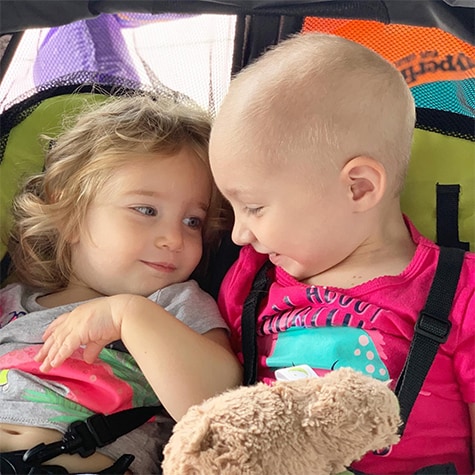Neuroblastoma is a cancerous tumor. It usually develops in the tissues of the adrenal gland, but it can also start in nerve tissues in a child’s neck, chest or spinal cord. It is one of the most common solid tumors in children and is most often diagnosed before age 5.

We’re committed to finding innovative treatments for children with cancer and blood disorders.
Home to one of the largest clinical trial programs in the country, we offer our patients access to some of the most novel treatment options.
Learn MoreAt the Aflac Cancer and Blood Disorders Center of Children’s Healthcare of Atlanta, we offer a full range of treatment options for kids and young adults diagnosed with neuroblastoma. We will create a treatment plan just for your child, as approaches to treatment can vary. Our team works closely with each family to determine the best course of action. Treatment options may include:
- Chemotherapy (chemo): A group of medicines that kill or damage cancer cells.
- Radiation therapy: The use of high-energy rays to kill or damage cancer cells.
- Surgery: A procedure to remove all or part of the tumor.
- I-131 MIBG treatment: Advanced treatment option for children battling high-risk, recurrent or refractory neuroblastoma or pheochromocytoma.
- Blood and marrow transplant (BMT): If your child has a cancer that is hard to treat, doctors sometimes use high doses of chemotherapy as part of the treatment. The high-dose chemotherapy can damage healthy blood stem cells. Your child may need a BMT to help rescue his blood stem cells after the chemotherapy.
- Developmental therapeutics: Some of the most promising new cancer treatments for children who have relapsed or who have difficult-to-treat cancers, offered through early phase clinical trials.
- Biological therapy and immunotherapy: Therapy used to stimulate your child’s immune system to act against the cancer cells.
A child with neuroblastoma may undergo any one of these treatments or a combination of them.

Genetic testing: Determining whether a sibling is at risk for cancer
The Tipton family turned to the Children’s Cancer Predisposition Program after one daughter was diagnosed with neuroblastoma and another was at risk for it.
Read moreWe are home to one of the leading childhood cancer programs in the country. Combining the latest proven technology and research with a caring, child-friendly approach makes the Aflac Cancer and Blood Disorders Center a top choice for the treatment of pediatric neuroblastoma.
Our highlights
- U.S. News & World Report ranks us among the top pediatric cancer programs in the country.
- Our program is led by Thomas Olson, MD, an internationally recognized expert in pediatric germ cell tumors.
- We are home to one of the leading pediatric programs in the country to offer MIBG therapy, an advanced treatment option for children battling high-risk, recurrent or refractory neuroblastoma or pheochromocytoma, treating more than 50 children with relapsed neuroblastoma over the past three years.
- We offer some of the most promising new cancer treatments for children who have relapsed or who have difficult-to-treat cancers through our Developmental Therapeutics Program.
- We are a Children’s Oncology Group Phase I institution and a member of the New Approaches to Neuroblastoma Therapy (NANT) consortium.
Receiving a cancer diagnosis for your child can be an emotional and overwhelming experience. At the Aflac Cancer and Blood Disorders Center, we are here to support you and your family. We make it our mission to provide the best care—and best experience—for every child, whether treating a toddler during an emergency or helping a teen through chemotherapy treatments. Family plays an important role in your child’s well-being. Not only are you a vital part of your child’s healthcare team, you are a source of security and comfort for your child.

We work to support your whole family while your child is in our care—and after she goes home.
Contact Us 404-785-1112

